Living in Singapore
Singapore is one of the most attractive destinations in the world for expats. It offers its residents a high quality of life and great opportunities for cultural exchange. Although there are both pros and cons of living in Singapore, integration is relatively easy because one of the principal languages is English, and the proportion of expats is high.

Pros and Cons of Living in Singapore: Pros
1. The Quality of Life Is High
Singapore is a safe country with great infrastructure, high salaries, a world-class healthcare system, a quality education system, and an interesting culture. In global surveys, it consistently ranks highly for quality of life and is considered a great place to live by many of its expats.
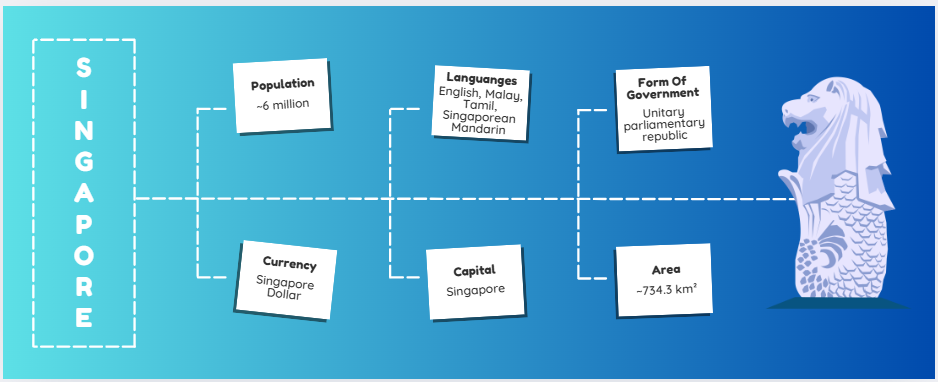
2. Taxes Are Low
Compared to many other developed countries, Singapore charges low taxes. Residents are taxed at a progressive rate from 0% to 24%. No tax is charged on incomes under S$20,000, and the maximum rate is only reached once an individual earns more than S$1,000,000. Non-residents pay a flat rate of 15% or the progressive resident tax rate, whichever is higher. This tax system makes Singapore an attractive destination for people of all income levels, but especially strong earners who want to avoid high tax rates.
3. There Is a Supportive Expat Community
Only around 3.6 million of Singapore’s 6 million inhabitants are citizens. The rest are temporary and permanent residents from other countries. Expats come from all over the world. Many are from China, Australia, India, the USA, and the UK. There are many expat groups, both international ones and country-specific clubs like the American Association of Singapore and the British Association of Singapore.
4. English Is Widely Spoken
When considering the pros and cons of living in Singapore, one of the most important factors is the language. Expats often choose a location based on where they will be able to communicate easily.
The four official languages in Singapore are English, Malay, Singaporean Mandarin, and Tamil. English is the most widely spoken language, and most international businesses operating in Singapore use it as their business language. It is also the primary instruction language in schools, although children are required to take one Mother Tongue subject (Mandarin, Malay, or Tamil). This makes it easy for expats and their families to integrate.
5. Singapore Is Culturally Interesting
Singapore is multi-ethnic, multi-lingual, and multi-cultural, which makes it a very diverse and exciting place to live. Most citizens are either of Chinese, Malay, or Indian heritage. When living in Singapore, you get to experience a wide range of cuisines, traditions, and festivals from the different heritage groups.
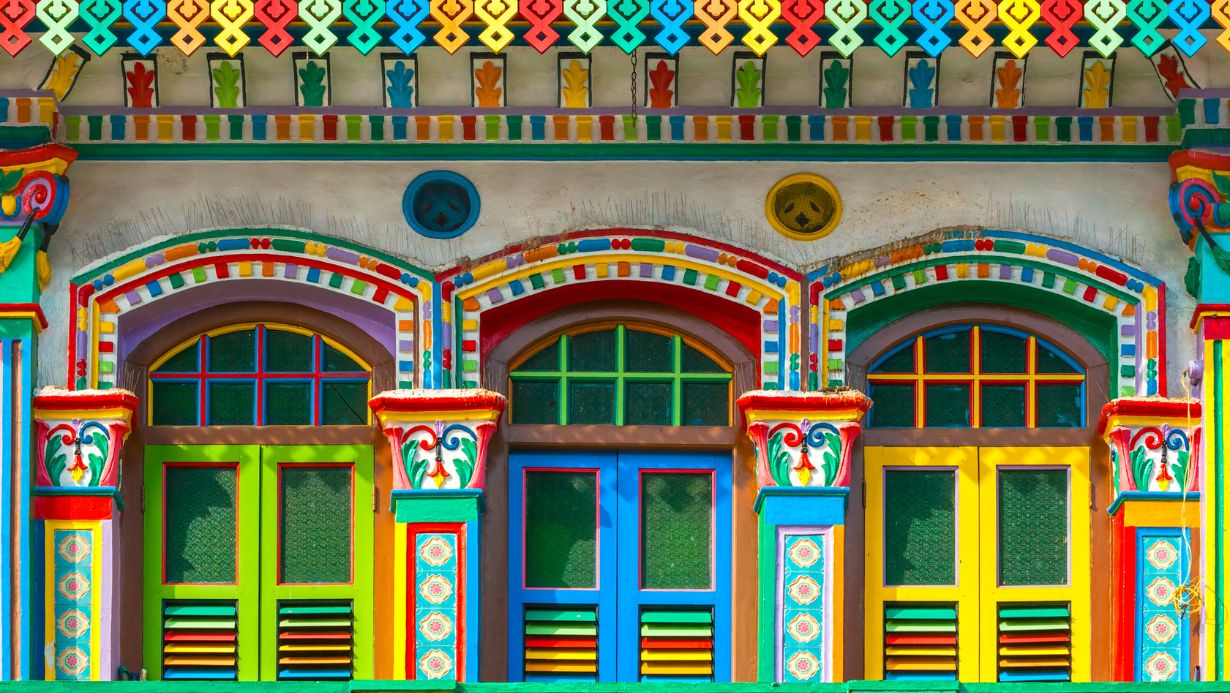 Little India in Singapore
Little India in Singapore
6. Healthcare Is Good
The Singaporean healthcare system regularly ranks in the top 10 worldwide, so residents can expect excellent care. Life expectancy is 83, which is higher than in the UK and the US, but comparable to Switzerland.
There are several reasons why the system is so strong:
- There are multiple financing schemes and a lot of government support.
- Public hospitals are more autonomous than in other countries, which leads to competition and a better patient experience.
- Residents pay a fee for every visit, so they don’t go to the doctor or clinic unless they really need to, and few people cancel appointments at the last minute.
- Strict gun and weapon laws prevent excessive accidents and crime-related injuries.
7. There Are Many Great Schools
Both public and private schools are excellent in Singapore. Expats who are expecting to stay in Singapore for many years may find public schools a more affordable option. Although the Singaporean curriculum is loosely based on the UK school system, the exams and course materials are different.
There are over 90 private international secondary schools in Singapore, so temporary expats have a lot of options. Students can complete their A-Levels or the International Baccalaureate at these schools, both of which allow them to attend universities worldwide.
8. Travel Is Easy
Although Singapore is small, there are endless opportunities for exploring nearby countries. Malaysia is the most accessible. You can get to several Malaysian towns and cities within a few hours by train, ferry, bus, or with a private driver. Other nearby countries include Thailand, Indonesia, the Philippines, Cambodia, and Vietnam.
Pros and Cons of Living in Singapore: Cons
1. The Cost of Living Can Be High
Both Singapore’s wages and the cost of living have increased rapidly in the past few decades. The biggest cost for residents is usually rent. A one or two-bedroom apartment in the city centre can cost more than S$3,000 per month, although more affordable and spacious homes are available in the suburbs. Additionally, expats who want to purchase Western foods will find that their food shops may be more expensive than in their home countries. However, small local supermarkets and hawker centres tend to be more affordable.
It’s also worth remembering that the median income (S$5,200) is more than 10 times as high as that of neighbouring countries, so most households can easily meet their needs.
2. You’ll Have to Get Health Insurance At First
The Singaporean healthcare system is based on three pillars:
- Medisave: A forced savings plan that gets deducted from residents’ savings and covers routine care.
- Medishield: A nationwide insurance system that covers more serious health issues and kicks in when a person’s Medisave funds are used up. Residents can opt out, but most see it as good value.
- Medifund: An investment fund the government uses to pay for the medical bills of those in need.
As an expat, you won’t have access to these benefits until you become a permanent resident. That’s why you need to take out private health insurance. Some employers cover this, but you may have to pay several thousands of dollars per year. The cost depends on your age and current health.
3. Housing Can Be Hard to Find
When weighing the pros and cons of living in Singapore, take into account that it can be challenging to find a home due to a lack of housing supply. You may need to stay in a furnished apartment or hotel for a few months while you look for a permanent home. Make sure to explore all avenues, such as property portals, estate agents, friends and family, and even your workplace contacts. Some employers help with the housing search.
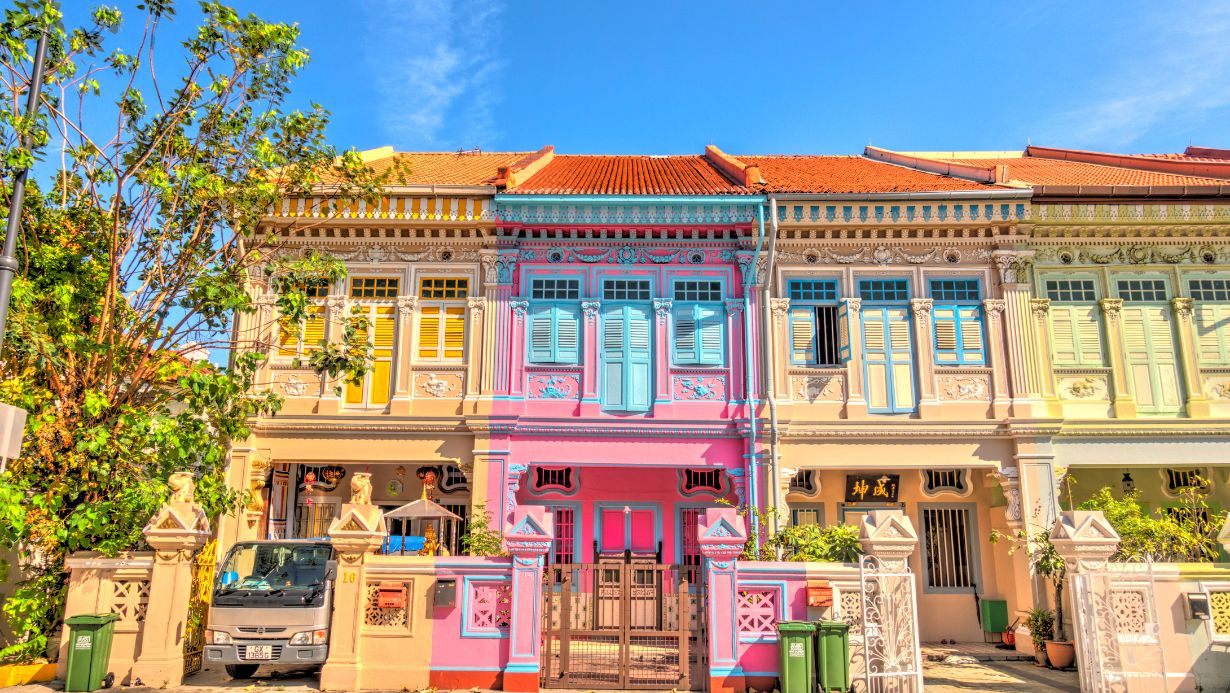 Traditional houses in the Joo Chiat district
Traditional houses in the Joo Chiat district
4. The Expat Community Can Be Transient
Most expats only stay in Singapore for a few years. Many job contracts and rents last two years, so this is a common length of stay. If you’re looking to live in Singapore for a long time and become a permanent resident, you’ll need to build a network beyond the expat community. Try to learn Malay, Hindi, or Mandarin, and take any opportunity you get to spend time with locals.
5. There Is a Very Clear Rule of Law
Some expats find that the laws and customs in Singapore can take some time to get used to. Littering, eating on public transport, and spitting in public can result in significant fines. Drinking is only allowed in certain locations and at certain times, and most places are smoke-free. Although these laws may seem restrictive at first, they contribute to a clean and orderly environment.
6. Car Ownership Can Be Expensive
Singapore is a small island with limited space, so car ownership isn’t as common as elsewhere. The cost of owning, registering, insuring, and maintaining a vehicle is higher than in most other countries. That’s why only about 470,000 out of 1.4 million households own a car. Fortunately, the public transport system is so efficient that residents without a car can still get around easily.
Moving to Singapore
Once you’ve understood the pros and cons of living in Singapore, it’s time to plan your move. Some of the most important steps are finding a job, getting a work visa, and finding an apartment. If you have children, you’ll also need to enroll them in a suitable school.
Getting a Singapore Work Visa
If you are travelling from an eligible country such as Switzerland, the UK, the US, or an EU country, you won’t need a visa to enter Singapore for a short-term stay. However, you can’t stay indefinitely or work in Singapore unless you have a valid work visa. You can obtain this if you have a job, a valid passport, and are over 18.
The two most common types of visas are:
- Employment Pass: This is for managers, professionals, and executives who earn more than S$5,000, or S$5,500 for financial services jobs. The EP qualifying salary increases with age. You can find your minimum required salary on the Ministry of Manpower website. An Employment Pass is typically valid for 1-2 years, but it can be renewed.
- S Pass: This is for mid-level skilled staff. The S Pass qualifying salary starts at S$3,150 and increases progressively with age. An S Pass is valid for up to 2 years but can be renewed.
More specific work permits are available for certain groups of people, such as those working in manufacturing, construction, marine shipyards, and entertainment.
When you get a job in Singapore, your company will apply for the appropriate work permit on your behalf. We at Rigby do this for our employees, if needed.
Permanent Residency
Once you’ve been in Singapore for a few years, you can become a permanent resident. This status gives you more stability and allows you to access some social security benefits.
You can apply for permanent residency with your Singpass. The easiest way to do this is to use the ICA e-Service. To make a decision, the authorities will take into consideration your length of residency, qualifications, age, economic contributions, family profile, and family ties to Singapore. Keep in mind that it might take 6-12 months for your application to be processed.
Moving to Singapore with a Family
Spouses and unmarried children under 21 are eligible for a Dependant’s Pass, as long as the Employment Pass or S Pass holder earns a minimum salary of S$6,000.
Singapore is a great place to live with a family because there are many family-friendly activities, it’s easy to get around, it’s safe, and the schools are excellent. Children can also benefit from exposure to the different cultures and customs.
Schools for Expats
As an expat, you can enroll your child in a public school if there are enough spaces. However, you won’t be able to benefit from subsidies, so you may have to pay significant school fees. It’s also important to note that the academic year coincides with the calendar year and that older children will need to pass an English and mathematics admission exam. If you’re not looking to become permanent residents, sending your child to a private school may be less disruptive because many of these schools offer the International Baccalaureate curriculum as well as the British and American education systems. Some even follow the German or French systems.
Working in Singapore
When considering the pros and cons of living in Singapore, don’t forget that you’ll need a well-paid job to cover your costs. As a new expat, you don’t benefit from Singapore’s social security system, so your cost of living will be higher than average.
What Is a Good Expat Salary in Singapore?
The average person in Singapore earned S$5,197 per month in 2023, which is around S$62,400 per year. Expats working in professional jobs often earn more than twice this amount. Some also receive generous relocation packages. Although expenses vary greatly, the typical expat living alone might spend around S$6,000 per month. Someone with a family, especially with children in private education, will spend significantly more.
Is It Hard to Get a Job in Singapore?
How long it will take you to find a job in Singapore depends on your skills, qualifications, and whether you already have contacts with local employers. Although you can send spontaneous applications to businesses, you’ll more likely land a job if you work with a recruitment agency that already has local contacts. Often, companies send requirements to recruiters before they are listed publicly. If you’re registered with an agency like Rigby, you’ll be the first one to access new jobs.
Most Popular Jobs in Singapore
In 2023, the proportion of newly created jobs rose because many businesses expanded their operations. Many of these jobs are for PMET (professionals, managers, executives, and technicians). The most popular PMET jobs are:
- IT
- Financial and insurance services
- Professional services
- Health and social services
Life in Singapore
Singapore is a fantastic place to live for singles, couples, families with children, and retired people. Whether you enjoy the hustle and bustle of inner-city life or the tranquility of the suburbs, you can find it in the Lion City.
Where Do Expats Live in Singapore?
There are 28 districts. Although expats live in all areas, some districts are more popular than others:
Marina Bay
Located in the south, this exclusive district features both ample green space and modern properties. Because the city centre is nearby, it is a very convenient and attractive place to live. Marina Bay is home to several celebrities as well as executives and high-level professionals.
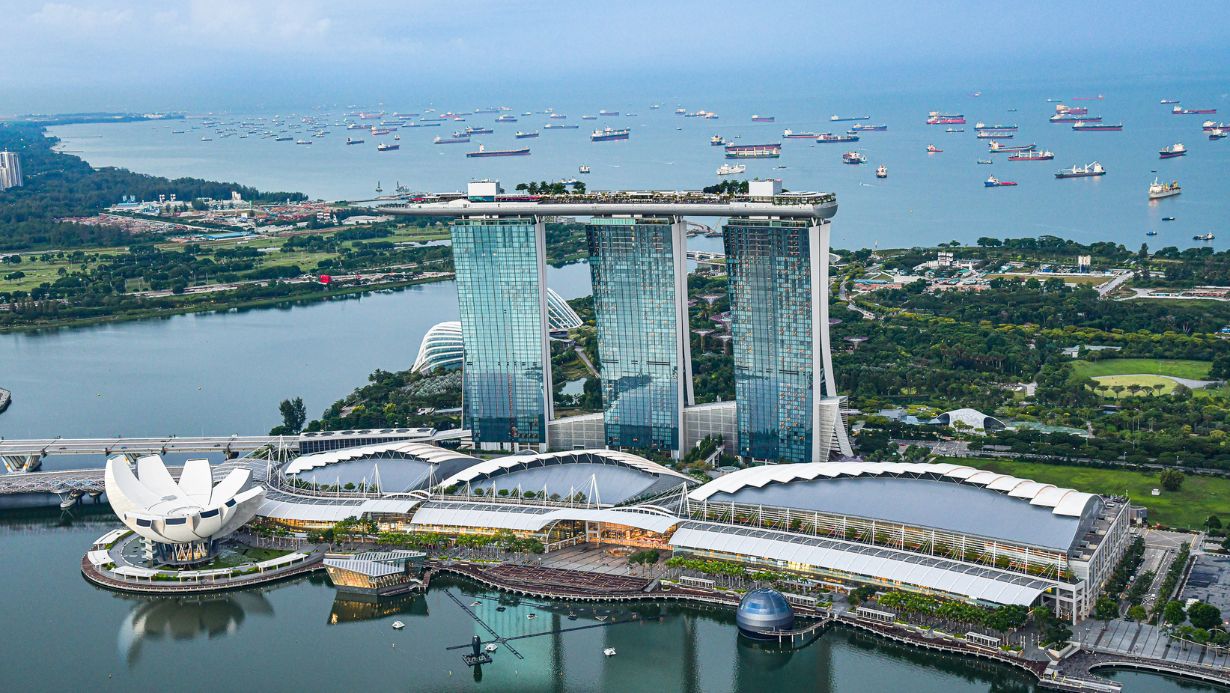 Marina Bay Sands
Marina Bay Sands
Tanjong Pagar
This district is also in the south, near Chinatown. Because there are many restaurants and bars, Tanjong Pagar is popular with single professionals or couples. Most people here live in condominiums.
Tiong Bahru
This is a slightly more affordable district, still located close to the centre. It contains Singapore’s oldest housing development, a large retirement population, and many trendy coffee shops, art galleries, and shops.
Sentosa
Sentosa is an island in the south, and it’s the home of many high-net-worth individuals looking for beach access and sea views. Because it’s separated from the rest of Singapore, residents have to commute, either by car or tram.
 Sentosa Island Beach Resort
Sentosa Island Beach Resort
Orchard Road and River Valley
As Singapore’s premier shopping area, Orchard Road is an exclusive place to live. The adjacent River Valley is more affordable but not as well-connected to the transport network.
Holland Village
If you’re moving to Singapore with a family, Holland Village is a great location. Here, you’ll find a more diverse range of housing options and even some gated communities. There are also plenty of green spaces, schools, and dining and entertainment venues.
East Coast
Thanks to the Thomson-East Coast Line (TEL), the East Coast districts are more well-connected than ever. They are a great place to live if you’re looking for respite from the hustle and bustle of the city, large parks, and more affordable properties.
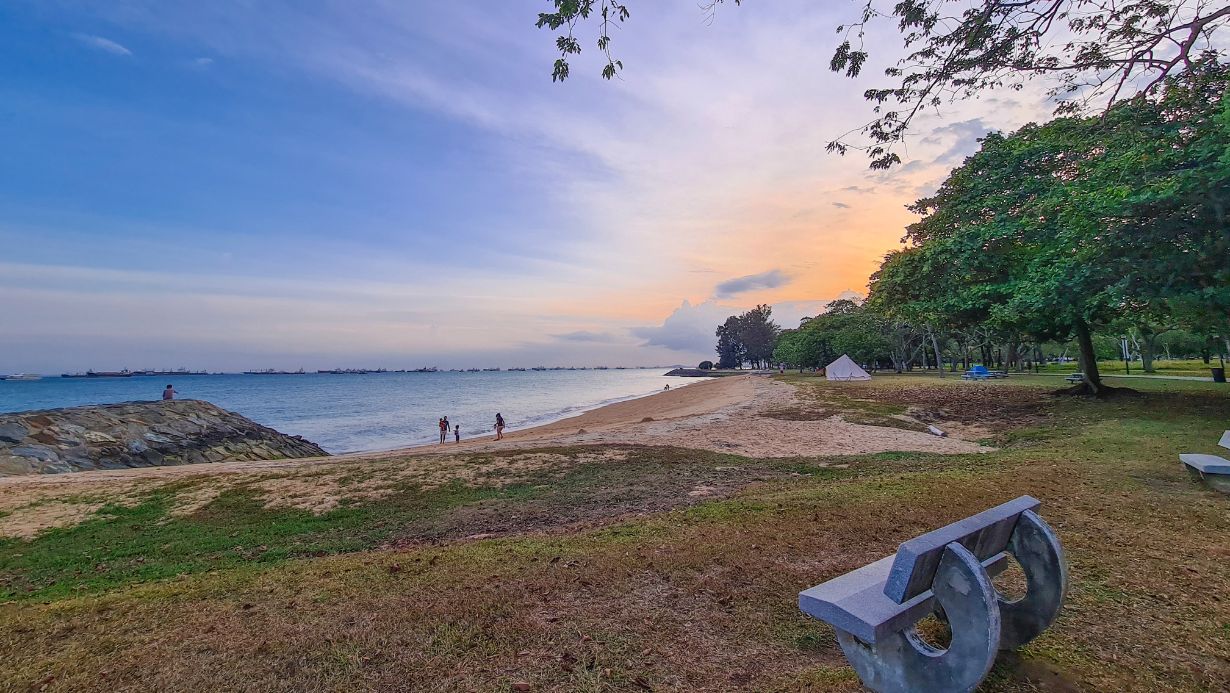 View from East Coast Park
View from East Coast Park
Woodlands
This district lies at the northern end of Singapore, and it’s perfect for both older and younger people who want more space and an outdoorsy lifestyle. There are nature reserves and forests, but you’ll also find a range of supermarkets, malls, and entertainment venues.
Singapore Culture Facts
Singapore is a place where many cultures come together.
- Religions: The biggest religions are Buddhism, Islam, Christianity, Taoism, and Hinduism.
- National languages: The four national languages are Malay, Singaporean Mandarin, Tamil, and English.
- Important values: Most Singaporean residents value both immediate and extended family, respect, and having personal dignity. Respect for elders is also very important.
- Communication: People tend to communicate less directly in Singapore than in other countries. Facial expressions, tone of voice, and posture help you understand how someone feels.
4 Big Singapore Traditions
The traditions and celebrations are very diverse. Here are four popular ones that take place throughout the year:
Chinese New Year
This festival is usually held in January or February and marks the beginning of the new lunisolar year. You’ll see dances, parades, carnival rides, lanterns, and fairs, particularly in Chinatown.
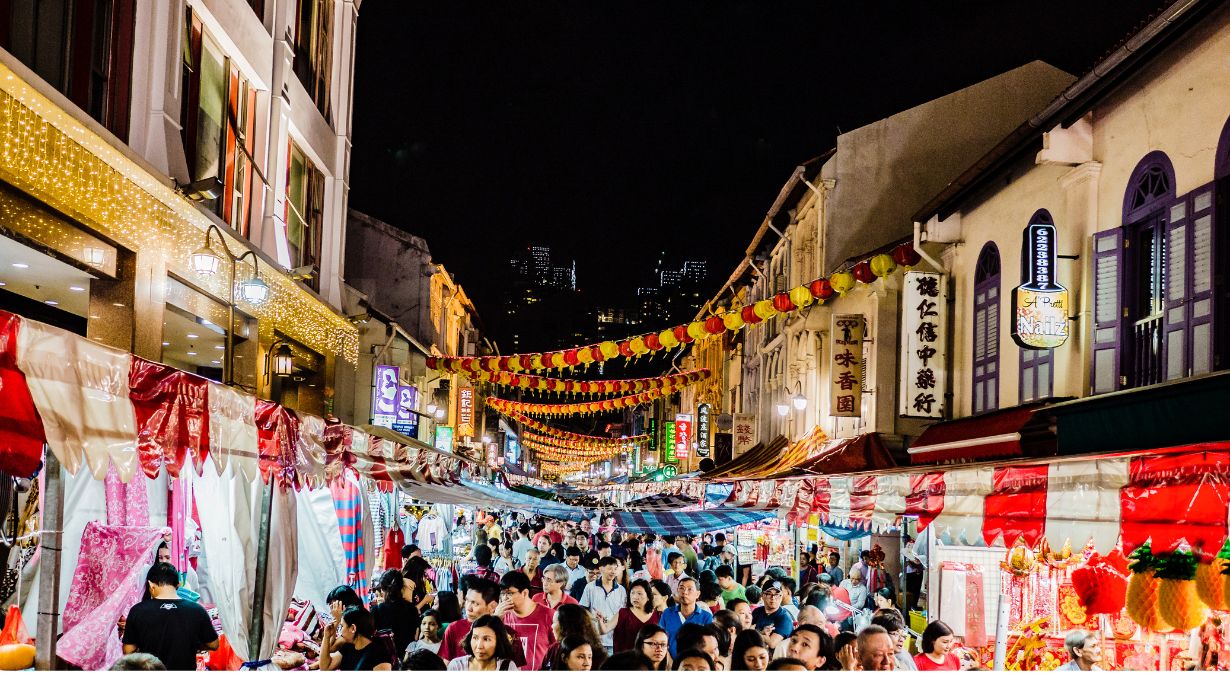 Chinese New Year celebration in Singapore’s Chinatown
Chinese New Year celebration in Singapore’s Chinatown
Singapore Heritage Festival
In May, you can explore various exhibitions, activities, tours, and trails related to Singapore’s heritage. The festival helps residents and visitors understand the history behind the city state’s buildings and sites.
Hari Raya Puasa (Eid al-Fitr)
The celebration of the end of Ramadan takes place in various locations around Singapore, but the centre of the festivities is Geylang Serai. You’ll be able to taste traditional Malay dishes and see cultural performances.
Deepavali
The Festival of Lights takes place in October or November and is mainly celebrated by the Hindu community in Little India. The public festivities include temple visits, parades, and performances. You can observe the rituals at Veeramakaliamman Temple, one of the oldest Singaporean temples.
While there are pros and cons of living in Singapore, most expats agree that it is a great place to live. If you’d like to explore opportunities in the Lion City, send a spontaneous application to Rigby AG. We’ll match you with suitable opportunities as soon as they come up.